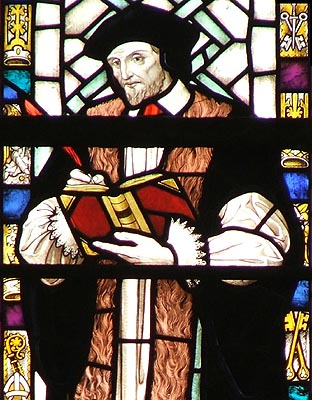 |
 |
|||
|
|
 Miles
Coverdale (1488-1569) Miles
Coverdale (1488-1569)Born: 1488 at Coverdale, Yorkshire Bishop of Exeter Died: 20th May 1569 at London Miles Coverdale, born in Yorkshire and educated at Cambridge, became an Augustinian canon, but was afterwards one of the earliest supporters of the English Reformation. He assisted Tyndale in the complete version of the Bible, printed probably at Hamburgh in 1535. A second edition followed, in 1537, and was that "permitted to be set up in parish churches" by King Henry VIII. In February 1539, Coverdale was living in Newbury, employing John Winchcombe Junior to communicate with Thomas Cromwell for him. However, he spent most of this portion of his life in Flanders and Germany, under the patronage of the PaIgrave. He returned to England, after the death of King Henry, "when the Gospel had a free passage and did very much good in preaching of the same". He was well received at court and, initially, spent much of his time at Windsor Castle. When Lord Russell was sent into Devonshire, in 1549, for the suppression of the Prayer Book Rebellion there, Coverdale attended him as chaplain and preached on the field, after the skirmish at Clyst St. Mary. On Bishop Veysey's resignation in 1551, he was appointed to the See of Exeter. His subsequent manner of life is thus described by Hooker, the historian of Exeter, who was personally acquainted with him: "He preached continually upon every holy-day and did read most commonly twice in the week in some one church or other within this city. He was, after the rate of his livings, a great keeper of hospitality, very sober in diet, godly in life, friendly to the godly, liberal to the poor, and courteous to all men. Void of pride, full of humility, abhorring covetousness and an enemy to all wickedness and wicked men, whose companies he shunned, and whom he would in no wise shroud, or have his house or company. His wife, a most sober, chaste and godly-matron. His house and household, another church in which was exercised all godliness and virtue. No one person being in his house which did not, from time to time, give an account of his faith and religion, and also did live accordingly." Coverdale was not, however, popular in the west, the general feeling of which was still strongly Romanist. "Notwithstanding this good man, now a blameless bishop, lived most godly and virtuously, yet the common people, whose old bottles would receive no new wine, could not brook or digest him, for no other cause but because he was a preacher of the Gospel, an enemy to Papistry and a married man. Many devices were attempted against him for his confusion, sometimes by false suggestions, sometimes by open railings and false libels, sometimes by secret back-bitings; and in the end, practised his death by empoisoning: but by the providence of God, the snares were broken and he delivered!" Coverdale was deprived and imprisoned on the accession of Queen Mary, but was released, at the earnest request of King Christian of Denmark, and permitted to retire to that country, from whence he went to Geneva. He returned to England on Queen Mary's death, but was never restored to his bishopric, partly owing, it is said, to his adherence to the principles of the Genevan reformers. The living of St. Magnus, in London, was bestowed upon him in 1564, but this, also, from his nonconformity, he was compelled to relinquish two years later. He died, aged 81, in 1565 and was interred in the church of "St. Bartholomew by the Exchange". This building was pulled down in 1840 when his remains were transferred to St. Magnus. Bishop Veysey was restored to the See of Exeter, on the accession of Mary, and held it till his death in 1555. Edited from Richard John King's "Handbook to the Cathedrals of England: Southern Division" (1903)
|
|||
| © Nash Ford Publishing 2003. All Rights Reserved. | ||||


